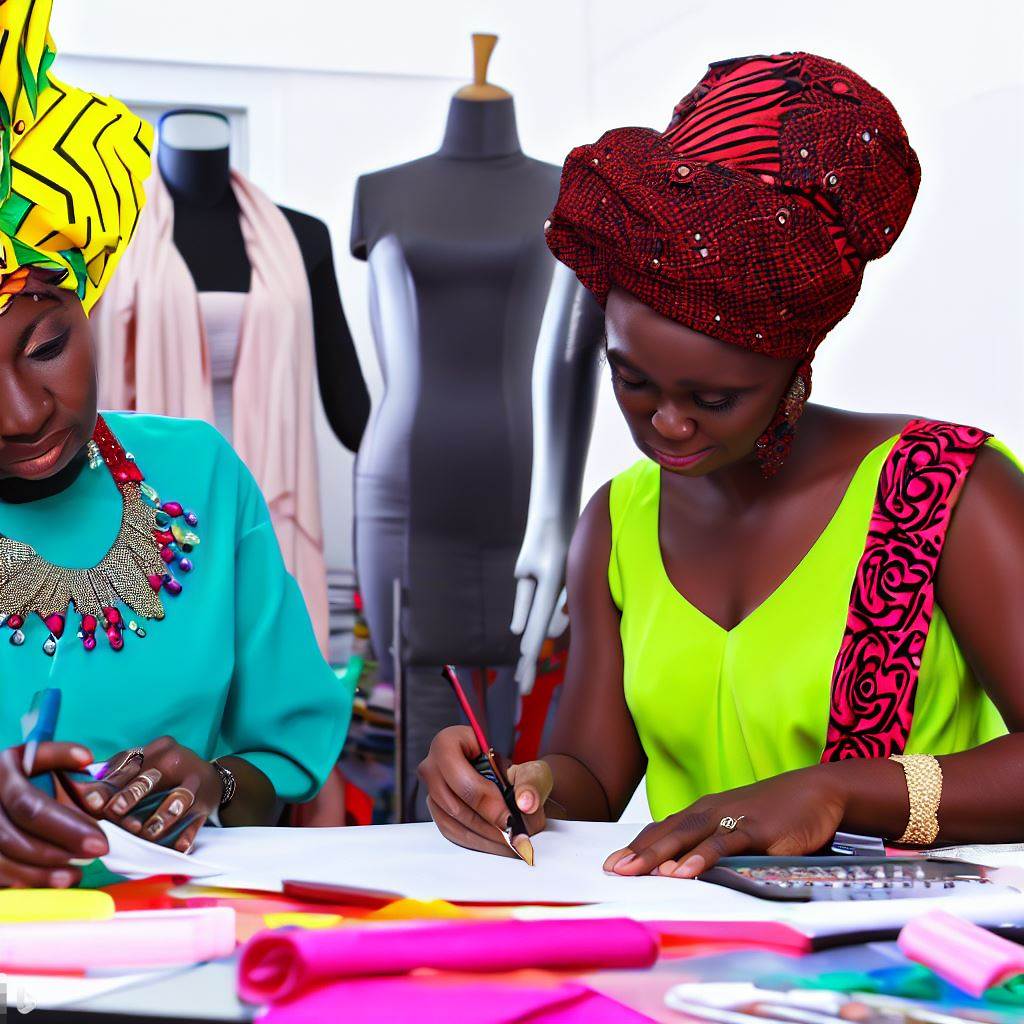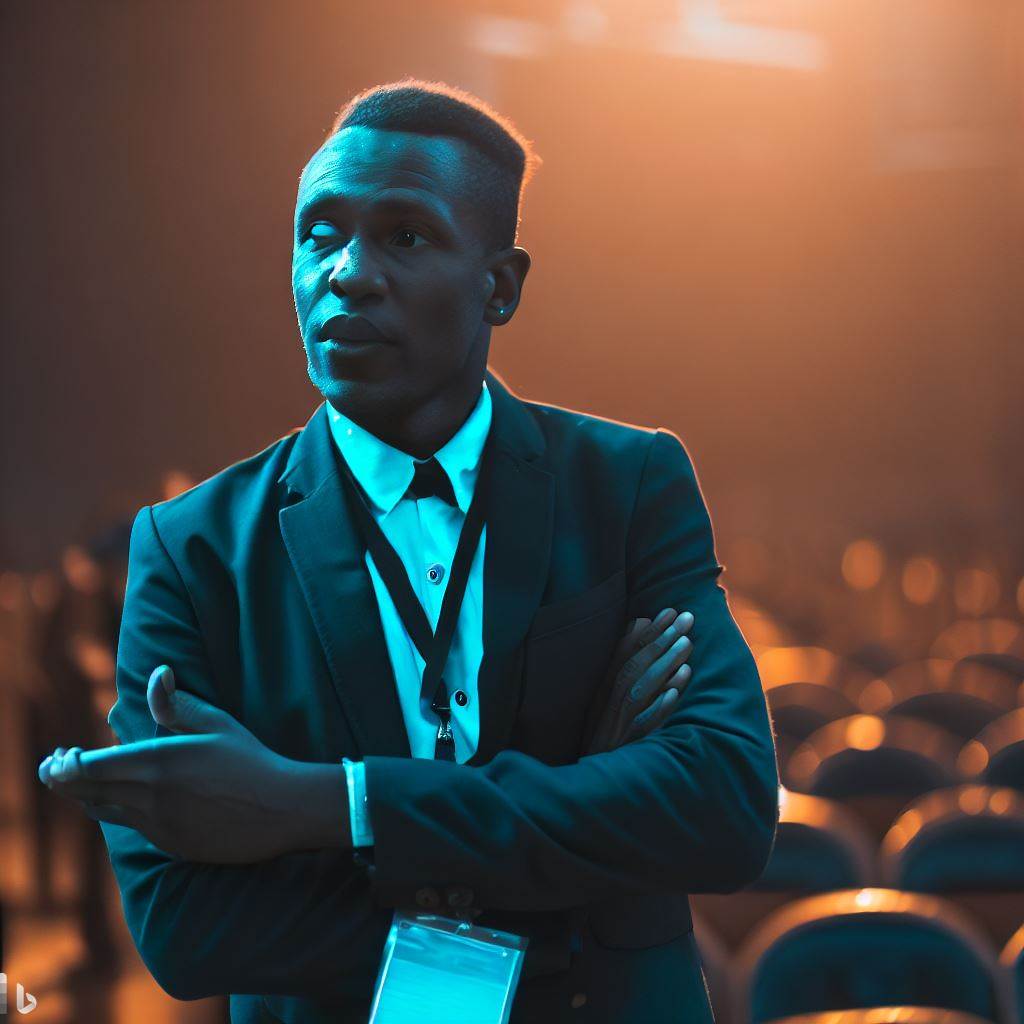Introduction
Nigerian textiles have become prevalent and highly significant in costume design.
Background information
Nigerian textiles hold a rich historical significance in the country.
Thesis statement
Nigerian textiles have had a profound influence on costume design, both locally and globally, due to their unique patterns, vibrant colors, and cultural symbolism.
Cultural Significance of Nigerian Textiles
A. Importance of Textiles in Nigerian Culture and Identity
- Nigerian textiles play a crucial role in the country’s culture and identity.
- They are deeply intertwined with Nigerian traditions, customs, and social etiquettes.
- Textiles are not just mere fabrics; they hold significant historical and cultural value.
- They are used in various aspects of Nigerian life, including clothing, ceremonies, and home decorations.
- Nigerian textiles contribute to the preservation and promotion of cultural heritage.
B. Types of Nigerian Textiles and Their Cultural Significance
- Aso-Oke is a popular Nigerian textile, traditionally worn by the Yoruba people during special occasions.
- It consists of intricately woven patterns and is often associated with wealth and prestige.
- Adire, another essential Nigerian textile, is made using a resist-dyeing technique.
- It features unique tie-dye patterns and is primarily produced by the Yoruba women.
- Ankara, also known as African wax print, is a vibrant and colorful fabric widely worn in Nigeria.
- It represents modern Nigerian fashion and is deeply rooted in West African culture.
C. Traditional Motifs and Symbols Used in Nigerian Textiles
- Nigerian textiles are adorned with various motifs and symbols, each carrying a specific meaning.
- Geometric patterns, such as triangles, circles, and squares, symbolize balance, harmony, and unity.
- Animal motifs, like birds and snakes, often represent spiritual and supernatural forces.
- Plant-based patterns, such as leaves and flowers, symbolize fertility and abundance.
- Some textiles feature symbols of royalty and leadership, representing wealth and power.
- These motifs and symbols give Nigerian textiles a distinct visual language and cultural significance.
In short, Nigerian textiles hold immense cultural significance in the country’s identity. They serve as a reflection of Nigerian traditions, customs, and social values.
With different types like Aso-Oke, Adire, and Ankara, each fabric carries its own historical and cultural importance.
Moreover, the motifs and symbols used in Nigerian textiles add depth and meaning to their visual appeal.
By incorporating these textiles into costume design, one can showcase and celebrate the rich cultural heritage of Nigeria.
Read: Understanding the Nigerian Music Industry for Concert Promoters
The Influence of Nigerian Textiles in Costume Design
A. Nigerian textiles as a source of inspiration for costume designers
1. Costume designers often draw inspiration from Nigerian textiles to create unique and vibrant designs.
- Nigerian textiles have become a major source of inspiration for costume designers around the world.
- With their vibrant colors, intricate patterns, and unique textures, these textiles offer endless possibilities for creating visually striking costumes.
- Costume designers have been known to draw inspiration from Nigerian textiles when designing outfits for characters in movies, plays, and television shows.
- The rich cultural heritage of Nigeria is reflected in these designs, adding authenticity and depth to the characters they portray.
2. Examples of Nigerian textile-inspired designs can be seen in various films, theater productions, and fashion shows.
- They are not just limited to traditional Nigerian attire but have also found their way into various fields of design, including films, theater, and fashion shows.
- For example, in the movie “Black Panther,” the costume designer Ruth E. Carter incorporated Nigerian textiles to bring Wakanda, a fictional African nation, to life on the big screen.
- The use of Nigerian textiles in this film not only enhanced the visual aesthetics but also paid homage to African culture.
B. Collaborations between Nigerian textile artisans and costume designers
1. Nigerian textile artisans often collaborate with costume designers to incorporate authentic Nigerian textiles into their work.
- Nigerian textile artisanship has gained recognition worldwide, leading to fruitful collaborations between artisans and costume designers.
- These collaborations create a bridge between traditional Nigerian textile techniques and contemporary costume design practices.
2. These collaborations have a significant impact on promoting Nigerian culture and textiles worldwide.
- Costume designers work closely with the artisans to select the right textiles, ensuring that the cultural significance and craftsmanship of the textiles are preserved.
- This collaboration not only gives exposure to Nigerian artisans but also promotes Nigerian culture and textiles on a global scale.
C. How Nigerian textiles continue to shape contemporary costume design
1. Nigerian textiles have a profound influence on contemporary costume design.
- When Nigerian textiles are incorporated into contemporary costume design, they bring a sense of authenticity and cultural diversity to the forefront.
- Designers have embraced Nigerian textiles and successfully integrated them into their own signature styles.
- They have become a vital element in creating unique and visually captivating costumes.
2. Notable designers have incorporated Nigerian textiles into their work, creating stunning and culturally-rich costumes.
- Notable designers such as Duro Olowu and Lisa Folawiyo have been at the forefront of incorporating Nigerian textiles into their work.
- Olowu, known for his bold and eclectic designs, often combines Nigerian wax prints with other fabrics to create visually stunning outfits.
- Folawiyo, on the other hand, is celebrated for her innovative use of Nigerian adire textiles, creating contemporary silhouettes that breathe new life into traditional designs.
To summarize, Nigerian textiles have made a significant impact on the world of costume design. They serve as a source of inspiration, enabling designers to create visually captivating costumes with cultural depth.
Collaborations between Nigerian textile artisans and costume designers not only promote Nigerian culture but also empower local artisans.
Nigerian textiles continue to shape contemporary costume design, leaving an indelible mark on the industry and showcasing the beauty and diversity of Nigerian culture to the world.
Read: Key Steps to Becoming a Concert Promoter in Nigeria
Nigerian Textiles in Film and Television
A. Examining the use of Nigerian textiles in Nollywood films
- Nigerian textiles have played a significant role in shaping the visual aesthetics of Nollywood films.
- These films, known for their vibrant cinematography and captivating storylines, often showcase the rich cultural heritage of Nigeria through the incorporation of traditional textiles.
- The use of Nigerian textiles in Nollywood films allows for a deeper connection to the characters and their culture.
- The costumes not only enhance the authenticity of the storyline but also serve as a visual representation of Nigerian traditions and values.
B. Infusing Nigerian textiles into costume design for international films set in Nigeria or with Nigerian characters
- Beyond Nollywood, Nigerian textiles have found their way into international films set in Nigeria or featuring Nigerian characters.
- This infusion of Nigerian textiles into costume design adds an additional layer of authenticity to these productions, further immersing the audience into the Nigerian cultural experience.
- By incorporating Nigerian textiles into the wardrobe of international films, costume designers pay homage to the country’s rich textile heritage.
- This not only showcases the diversity of Nigerian culture but also promotes the global recognition of Nigerian textiles as a form of art.
C. Analysis of the impact and representation of Nigerian textiles in television shows
- Television shows have also embraced the use of Nigerian textiles and have undoubtedly impacted the way these textiles are perceived globally.
- By incorporating Nigerian textiles into the wardrobe of characters, TV shows create a platform to showcase the beauty and significance of these fabrics.
- The representation of Nigerian textiles in television shows goes beyond mere aesthetics. It serves as a form of cultural expression and encourages the appreciation and celebration of Nigeria’s textile traditions.
- This representation also opens doors for dialogue about the diversity and uniqueness of Nigerian culture.
- The impact of Nigerian textiles in television shows extends beyond the screen. It influences fashion trends, advances cultural exchange and empowers Nigerian designers, artists, and artisans.
- The popularity of these textiles in mainstream media serves as a testament to their artistry and craftsmanship.
Basically, Nigerian textiles have made a formidable mark in the world of film and television.
From their prominent use in Nollywood films to their integration into international productions, these textiles add depth, character, and authenticity to the visual storytelling medium.
The impact and representation of Nigerian textiles go beyond aesthetics, as they contribute to cultural preservation, recognition, and global appreciation.
The future holds even more exciting possibilities for the continued influence of Nigerian textiles in costume design.
Read: Behind the Scenes: A Day in the Life of a Nigerian Circus Performer

Global Adoption of Nigerian Textiles in Fashion
A. Nigerian textiles as a trending fashion statement worldwide
- Nigerian textiles have gained immense popularity as a fashion statement on a global scale.
- The vibrant and intricate designs of Nigerian textiles have captured the attention of fashion enthusiasts worldwide.
- The unique patterns and colors of Nigerian textiles add a distinctive and exotic touch to any outfit.
- Nigerian textiles have become a symbol of cultural exchange and appreciation in the fashion industry.
B. Designers and fashion houses incorporating Nigerian textiles in their collections
- Renowned designers and fashion houses have increasingly incorporated Nigerian textiles into their collections.
- Nigerian textiles have been featured on prestigious runways around the world, including Paris, Milan, and New York Fashion Weeks.
- Designers recognize the rich heritage and craftsmanship of Nigerian textiles and strive to showcase them in their creations.
- By incorporating Nigerian textiles, designers add an element of cultural diversity and inclusivity to their fashion lines.
- The global recognition of Nigerian textiles has opened doors for collaborations between Nigerian artisans and international fashion brands.
C. Popular celebrities and influencers promoting Nigerian textiles in their fashion choices
- Influential celebrities and fashion influencers have embraced Nigerian textiles and promoted them through their fashion choices.
- By donning Nigerian textiles, celebrities showcase their support for cultural diversity and appreciation.
- The influence of celebrities wearing Nigerian textiles has sparked a trend among their followers and admirers.
- Through social media platforms, influencers share the beauty and versatility of Nigerian textiles, encouraging others to explore these unique fabrics.
- The endorsement of Nigerian textiles by popular figures has significantly contributed to their global recognition and acceptance.
In summary, Nigerian textiles are spreading their influence across the global fashion industry. The vibrant designs and distinctive patterns have made them a trending fashion statement worldwide.
Renowned designers and fashion houses are incorporating Nigerian textiles into their collections, adding diversity and cultural appreciation to the industry.
Additionally, popular celebrities and influencers are actively promoting Nigerian textiles through their fashion choices, creating a ripple effect of interest and admiration.
As a result, the global adoption of Nigerian textiles in fashion continues to grow with each passing day, cementing their place in the international fashion scene.
Read: Showcasing Nigerian Identity through Costume Design
Challenges and Opportunities for Nigerian Textiles in Costume Design
A. Need for protecting and preserving traditional Nigerian textile practices
- The rich tradition of Nigerian textiles offers a vibrant and unique heritage for costume design.
- Preserving these traditional practices is essential in showcasing Nigeria’s cultural identity through costumes.
- Modernization and globalization pose a threat to the survival of these traditional textile techniques.
- Efforts must be made to protect and promote these practices to prevent their extinction.
- Collaborations between designers and artisans can help preserve traditional techniques while incorporating them into contemporary designs.
- Education and awareness programs are crucial in fostering appreciation and understanding of Nigerian textile practices.
- Government support through funding and policy initiatives can ensure the preservation of these age-old traditions.
- Efforts should also be made to document and archive these practices for future generations.
- By protecting and preserving traditional Nigerian textile practices, costume designers can create authentic and culturally meaningful designs.
B. Potential economic opportunities and empowerment for Nigerian textile artisans
- Nigerian textiles have the potential to generate economic opportunities for local artisans and communities.
- Increased demand for Nigerian textiles in costume design can provide a sustainable source of income for artisans.
- Through collaborations with designers, artisans can expand their market reach and gain exposure to a global audience.
- Empowering textile artisans can contribute to poverty reduction and livelihood improvement in Nigeria.
- Artisans can pass down their skills and knowledge to future generations, ensuring the longevity of traditional practices.
- Exporting Nigerian textiles can contribute to the country’s overall economic growth and promote cultural exchange.
- Investment in infrastructure and technology can enhance the production and distribution of Nigerian textiles.
- Creating platforms for artisans to showcase their work and connect with potential buyers can boost their entrepreneurial spirit.
- By harnessing the economic potential of Nigerian textiles, costume designers can support local communities and contribute to sustainable development.
C. The importance of promoting sustainable and ethical practices in the Nigerian textile industry
- Ethical sourcing of materials is crucial to maintain the sustainability of the Nigerian textile industry.
- Ensuring fair wages and working conditions for artisans is essential for ethical production practices.
- Promoting sustainable dyeing and printing techniques can minimize the industry’s environmental impact.
- Investing in research and development to find eco-friendly alternatives for production processes is necessary.
- Collaboration with NGOs and international organizations can provide support and resources for implementing sustainable practices.
- Educating consumers about the importance of sustainability and ethical practices can drive demand for responsibly produced Nigerian textiles.
- Certification programs and standards can help consumers identify ethically made Nigerian textiles.
- By promoting sustainable and ethical practices, the Nigerian textile industry can gain recognition and support in the global market.
- Costume designers have a responsibility to prioritize sustainability and ethics in their use of Nigerian textiles.
In costume design, Nigerian textiles face interconnected challenges and opportunities, highlighting their complex relationship.
Protecting and preserving traditional practices not only enriches costume design but also provides economic empowerment for artisans.
Promoting sustainability and ethics ensures the long-term viability of the industry.
By recognizing and embracing these aspects, Nigerian textiles can thrive in costume design while preserving their cultural significance.
Read: Nigeria’s Contribution to Circus Performance Art
Gain More Insights: Understanding the Nigerian Music Industry: Director’s View
Conclusion
A. Recap of the influence and significance
The influence and significance of Nigerian textiles in costume design have been undeniable.
Reinforce the idea that Nigerian textiles continue to inspire and shape the world of fashion and costume design
Nigerian textiles continue to inspire and shape the world of fashion and costume design.
Closing thoughts on the future potential and impact of Nigerian textiles in costume design and beyond.
Looking ahead, the future potential and impact of Nigerian textiles in costume design and beyond are promising.




